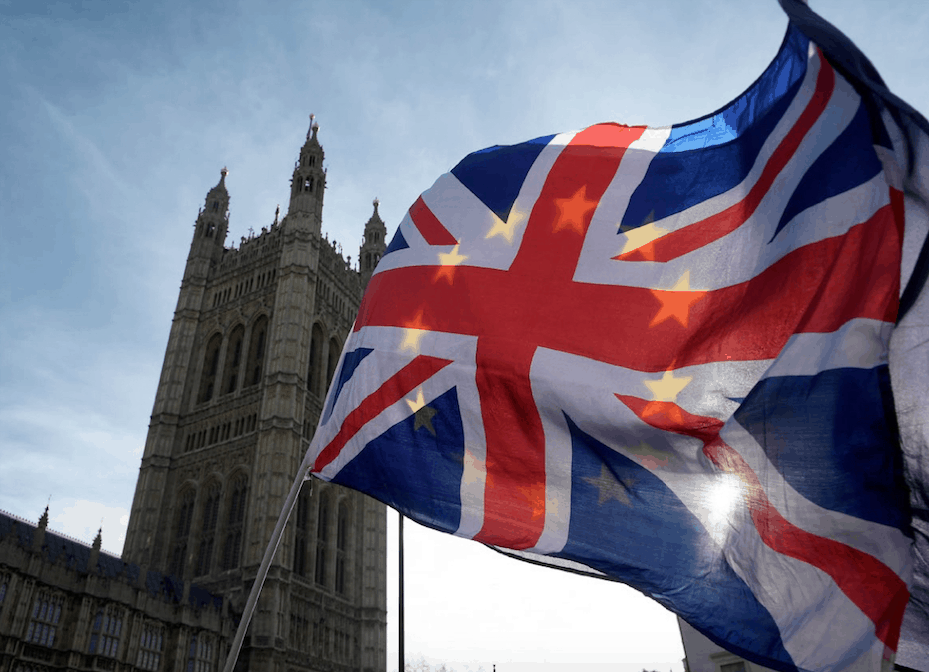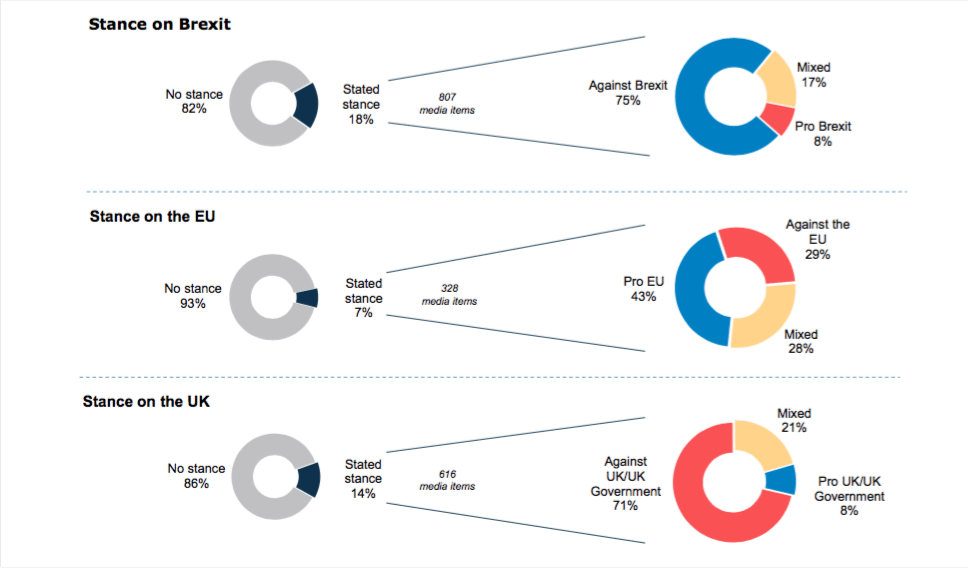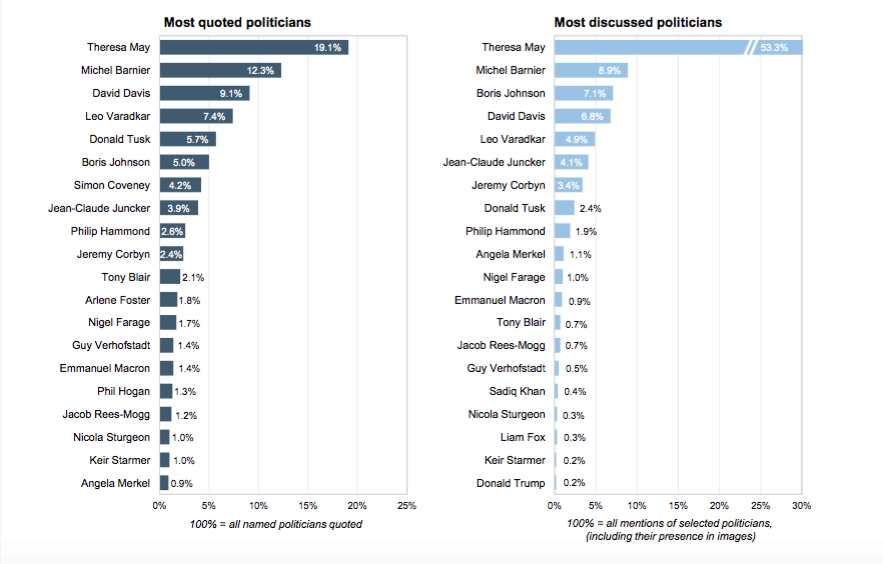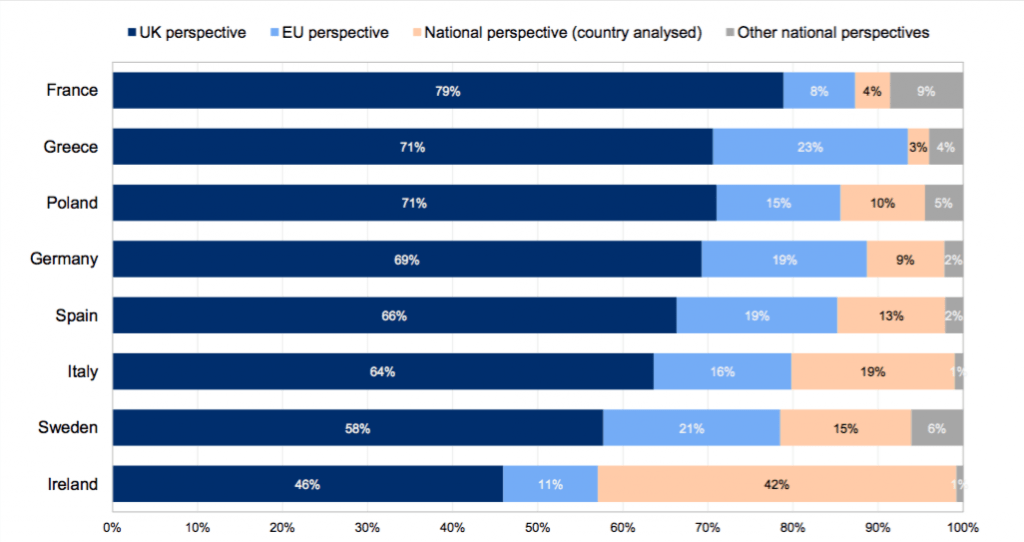
If one believes radical Brexiteers such as Nigel Farage or Jacob Rees-Mogg, Brexit is above all a question of “Them against us”. Europe? Only interested in harming the United Kingdom. The European press? A bunch of biased journalists and media houses trying, together with the EU, to create negative sentiment against the British as a punishment for their decision to leave the block. European outlets are often cast as part of an elite project opposing the “will of the people”.
Just as many other statements from Brexit supporters, these prejudices should be treated with caution. Particularly as regards the alleged biased attitude of the European media against the United Kingdom and Brexit, new research comes to the opposite conclusion.
Interested But Not Engaged
In our new study for the Reuters Institute for the Study of Journalism, we found that outlets in eight European countries reported on Brexit and the negotiations mostly in one way: neutral and fact-based – something that cannot necessarily be said of the coverage of some of the UK’s major newspapers.

Another difference is not only a more objective attitude, but also the way in which the consequences of Brexit were discussed in the rest of Europe. Europe’s media seem to be largely unconcerned about the consequences of Britain’s withdrawal on their own country and the EU. We found that only about one in 10 pieces treated Brexit from a national perspective. If Ireland was excluded, 69 percent of the news mainly dealt with the consequences of Brexit for the British themselves, while only just under one fifth discussed its effects on the European Union. For Diego Bironzo, one of co-authors, the result is clear: “The central narrative in the European press is that Brexit is first and foremost a challenge for the United Kingdom, and only to a lesser extent for the European continent, its institutions and the individual countries”.
What About EU Citizens?
But isn’t this distanced and objective attitude a surprising finding? Should one not expect more excitement, more angry and warning comments about the this decision? Not necessarily. “It may come as a surprise that European media are so unconcerned about the effects of Brexit and remain largely neutral in their coverage,” says Alexandra Borchardt, the lead author of our study. “But it makes sense: reporting on Brexit as it is may be more effective than the strongest comment when it comes to sending a warning to readers.”
One concerning finding of our study, however, is the lack of media interest in the fate of citizens directly affected by Brexit on both sides. “The impact of Brexit on EU citizens’ lives has been given limited space so far in the news. Considering the potentially huge implications, it may be worth for media organisations to reflect on how to ad- dress this,” says Diego Bironzo. Instead, reporting focused mainly on the economy and trade relations between the UK and the EU.
Despite their largely neutral reporting, however, European media could ultimately not entirely resist to express some opinion on Brexit and the negotiations. And once they took a stand – according to our study in about 18 percent of all cases – they made no secret of their opposition to Brexit.
Main Findings
While the full report can be downloaded here, we have summarised some of the main findings below:
- European media coverage of Brexit was predominantly neutral and fact-based. Most (82%) of the analysed news items took no position in relation to Brexit, only 18% conveyed a clear opinion.
- Of those media items that took a position on Brexit, just 8% were pro-Brexit, as opposed to 75% against.
- When European media items took a position on the UK and the UK government (14%), their view was mostly negative and critical (71%)
- Most (59%) of the coverage dealt with the challenges the UK itself will be facing, rather than what Brexit means for each respective country, (this figure increased when Irish coverage was excluded).
- With the exception of Irish media, coverage reflected a lack of anxiety about the impact of Brexit on Europe, and the EU’s future. If Irish media are excluded, 69% of the analysed European news items reported on the British situation; fewer than one in five articles discussed implications for the EU.
Most (and least) reported topics:
- Excluding any generic references to Brexit:
Just over one third (35%) of reporting across all studied countries covered progress and setbacks in the Brexit negotiations. - The remaining coverage (65%) focused on more specific issues. Of these, half concerned the economy, business and trade. Coverage of EU bureaucracy, standards and regulations played a role in only a small proportion (3%) of content studied.
- Reporting about migration from non-EU countries into the EU, as well as mobility (the right of Europeans to move to other EU countries), took up only 10% of all issue-related coverage, this figure decreased to 5% when news articles about the impact of Brexit on Ireland were omitted.
- Security and defence featured in just 1% of the issue-related coverage.
- Sovereignty – ie an EU country’s ability to make its own laws and decisions independent of the EU – was barely discussed (3%).

Most (and least) quoted politicians:
- The most quoted person of all protagonists was British Prime Minister, Theresa May (19.1%). The next most quoted – although some way behind – was Michel Barnier, the EU’s chief negotiator (12.3%).
- Jeremy Corbyn, the UK Labour leader, was quoted 5% of the time. Nigel Farage, the vocal Leave campaigner was barely quoted (1.7%).
- Jacob Rees Mogg, a pro-Brexit Conservative MP, (1.2%) was quoted more often than Angela Merkel (0.9%), despite having no official role in the negotiations.
- Politicians from other EU countries were rarely quoted on Brexit issues. This contrasts with the impression sometimes given in British media coverage that European politicians ‘meddle’ in British affairs.
- When protagonists were quoted, the tone of the debate was set mainly by UK Conservatives (23.1%) and EU institutions (19.8%). UK Labour politicians played a negligible role: they were quoted in only 5.4% of news items. French, German or other EU national politicians were quoted in fewer than 3% of reports.
- Regarding mentions of politicians, 53.3% of mentions were of Theresa May, Michel Barnier, 8.9% and Boris Johnson, 7.1%.

Key findings by country: Who is interested in what?
- France: Coverage in the French media represented 7% of the total sample studied, the third lowest in the study. French media reported Brexit as more of a challenge for the United Kingdom rather than for the French or the EU. Coverage in France contained the highest proportion of opinion articles – 46% of articles about Brexit took a position on the topic, with 60% of these arguing against Brexit.
The most visible topic in the country’s coverage was the economy and trade relationships. Almost 80% of all items published on Brexit in French outlets focused on the UK perspective – The French newspaper Le Figaro called Brexit a “Westminster psychodrama”. - Germany: Germany had the second highest volume of coverage (14%) in the study, after Ireland. Most, (92%), of German coverage was neutral. Of the remaining 8% most (75%) was anti-Brexit. 70% of articles focused on the UK perspective; 19% of all reports focused on the EU perspective; national perspective was 9% of coverage. German press expressed some “amazement” that UK policymakers hope Germany will go the extra mile to help Britain achieve good deals on withdrawal and the future UK-EU relationship. Another common theme was surprise at how ‘ill-prepared’ British politicians were for negotiations.
- Greece: Greek media covered Brexit extensively (11% of total coverage – the third highest in the study). 71% of Greek coverage focused on UK perspective. Most articles were factual (94%), but the remaining 6% were overwhelmingly negative. Media in general tried to emphasise the dire consequences Britain will face from Brexit, possibly to deter anti-EU Greeks from demanding to leave the EU. Headlines included some about “food shortages” and how Brexit would cost the UK economy, “tens of billions”.
- Ireland: Coverage in Ireland was by far the most extensive. It made up 40% of the total sample studied (1838 media items). The extent of coverage indicated the country’s close involvement in the Brexit process – in particular the border to Northern Ireland. Reporting appeared divided equally between the Irish and the British perspectives. Irish media in particular expressed strong views against Brexit.
- Italy: That coverage in Italy’s media only made up 7% of sample indicates the Italian press were only moderately interested in Brexit – less than Spain and Greece, but more than France. 64% of coverage focused on the UK; 19% of articles focused on the implications for Italy. The relatively high focus on national interest could reflect concerns in Italy about growing anti-EU sentiment in the run up to the country’s recent elections. Coverage was overwhelmingly neutral (94%).
- Poland: 6% of the total sample of Brexit news reports were in the Polish media. 61% of articles remained neutral, lower than most other countries in the study. 39% of articles expressed an opinion – mostly (71%) of opinion articles were anti-Brexit. One in ten articles reported on the impact of Brexit upon Poland. Only 3% of Polish coverage dealt with the rights of Poland’s estimated 900,000 citizens currently living in the UK to stay there after Brexit.
- Spain: 11% of total sample – the fourth highest in the study. 66% of Spanish media coverage devoted to the UK perspective; 19% to the EU, 13% to the impact of Brexit upon Spain. Brexit is seen as a disaster for UK by most Spanish commentators. The largely negative position taken by Spanish press linked to attempts to discourage Catalonian independence movement. Much of the coverage focused on Gibraltar (most, 90%, of Gibraltar residents want to stay attached to Britain but also remain in EU). The fate of 300,000 British ex-pats living in Spain featured in coverage.
- Sweden: 4% of the total sample – only 182 articles over the seven months studied, the lowest in the study. Most of the articles that took an opinion on Brexit argued against it. Only four news items were in favour of Britain leaving the EU. 15% of articles were about the impact of Brexit upon Sweden, (the highest proportion after Ireland). This could be related to Sweden’s perception that Britain was its ally in the EU, for example both countries remained outside the Eurozone. A relatively high amount of interest in the impact of Brexit on Sweden could also reflect fears that Swedes could demand a similar referendum on leaving the EU.

The report was written by Dr Alexandra Borchardt, Director of Strategy at the Reuters Institute for the Study of Journalism; Felix M Simon of the Reuters Institute for the Study of Journalism and Diego Bironzo, formerly of PRIME Research. The full report can be downloaded for free here.
If you liked this story you might also be interested in “They tell the truth I like” – Partisan And Alternative News Sites in Europe.
Sign up for the EJO’s regular monthly newsletter or follow us on Twitter.
Tags: BREXIT, Eu, Europe, European Media, European Union, Journalism, media coverage, press, Uk, UK Media













































